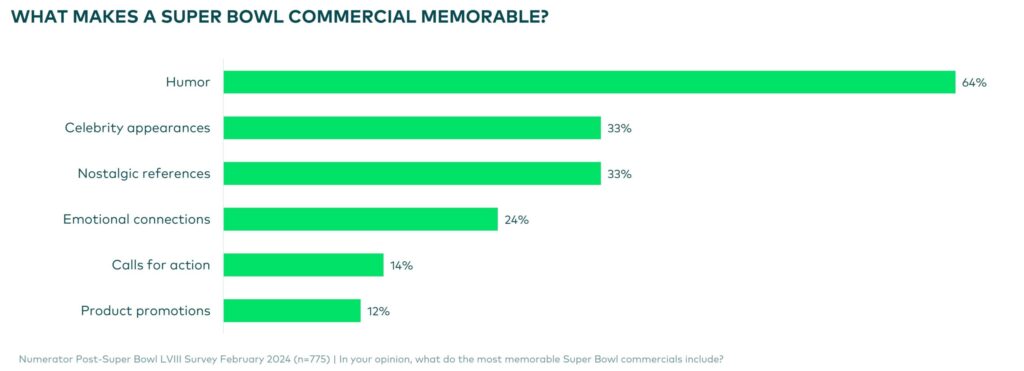
Audience
- Sentiment: Neutral
- Political Group: Moderate
- Age Group: 18-34
- Gender: Female
Overview
- Super Bowl LVIII featured a record number of celebrity ads but their effectiveness was only slightly above average.
- Gen Z influencers are gaining traction and often outperform traditional celebrities in consumer engagement.
- The future of advertising may shift towards authenticity and relatability rather than celebrity endorsements.
Super Bowl LVIII Ads: A Look at Celebrity Influence and Engagement Trends
Super Bowl LVIII is not just an event for football fans; it’s a cultural phenomenon that brings everyone together, from die-hard sports enthusiasts to those who just tune in for the halftime show and the commercials. Each year, companies pull out all the stops to create memorable ads that will entertain us during the breaks in the game. One of the most interesting aspects of these commercials is how much celebrities are involved. In this article, we’ll explore the role of celebrities in Super Bowl marketing, the trends that emerged from this year’s ads, and why some ads worked better than others.
The Celebrity Effect
Every year, the Super Bowl ads feature a smorgasbord of celebrities. It feels like they are everywhere! Whether it’s big movie stars, famous athletes, or pop music icons, brands hope these familiar faces will grab our attention and make us more likely to buy their products. This year’s Super Bowl was no different. Out of a whopping 94 commercials shown during the game, a record-breaking 57 of them featured celebrities. That’s a jaw-dropping 22% increase compared to last year!
You might think that having a celebrity in an ad guarantees success. After all, we love to see our favorite stars, right? But interestingly, even though many ads starred famous people, the overall effectiveness of these celebrity-driven commercials was only slightly above average. This suggests that while we love seeing stars, it doesn’t always mean we’re going to rush out and buy what they’re selling.
One striking takeaway from Super Bowl LVIII was that not all the crowd-pleasers featured Hollywood’s biggest names. In fact, among the six most effective ads that weren’t trailers for upcoming movies, only one had a celebrity in it. This raises a big question: Are audiences starting to become tired of celebrity endorsements?
The Rise of Gen Z Influencers
As if that wasn’t enough to get us thinking, another major trend this year was the rise of Gen Z influencers. You might be wondering, who are Gen Z influencers? Well, they’re the younger, often digital-native stars who gained their fame online, particularly through platforms like TikTok and Instagram. Many of these influencers have developed huge followings, and their audiences trust them to provide authentic recommendations.
This year, these Gen Z influencers managed to outperform several traditional celebrities in terms of consumer engagement. It makes sense when you think about it. These younger influencers are relatable; they often speak directly to their audience in a way that feels personal and genuine. When they advertise a product, it doesn’t come off as just an endorsement—it feels like a recommendation from a friend.
For example, while we may enjoy seeing A-list actors like The Rock or Taylor Swift in commercials, many of us also know that they are being paid a lot of money to promote products. On the other hand, a TikTok star we follow might share their honest opinion about a new drink or fashion item, and we’re more likely to believe them because they seem more like us. This shift in influence highlights a significant change in how marketing and engagement work today.
Ads That Stood Out
According to research gathered from this year’s Super Bowl ads, some brands really hit the mark while others missed the boat entirely. For example, T-Mobile and Ram Trucks were two companies that produced effective ads that resonated well with viewers. T-Mobile took an innovative approach by incorporating humor and relatable situations into their advertisement, while Ram Trucks appealed to feelings of nostalgia and Americana, which also connected well with audiences.
Interestingly, AI-generated ads seemed to create quite a buzz before the big game, but when the ads were actually shown, they largely underperformed. This could be attributed to the fact that while AI can do some amazing things, it often lacks the human touch or emotional connection that makes ads memorable. We may be living in a tech-driven age, but when it comes to advertising, the human element is still incredibly important.
The Changing Landscape of Marketing
As we look to the future of Super Bowl advertising, it’s clear that the marketing landscape is changing. Yes, celebrities still have a place, but their influence may be starting to wane. Companies are beginning to recognize that having a big name in their ads isn’t always a surefire success. Instead, they might start looking more towards authentic connections, creativity, and relatability.
This pivot could significantly reshape how brands approach advertising. Instead of just throwing money at celebrities, companies might invest more in understanding their audience and finding unique ways to tell their stories. Ultimately, a well-told story—whether it involves a celebrity or not—can make a far more profound impact than just a big-name endorsement.
What Does This Mean for You?
So what does all this celebrity influence and engagement mean for you, the viewer? It’s essential to recognize that your preferences matter. If you find yourself drawn more to relatable influencers or innovative storytelling rather than star power, you’re not alone. As viewers and consumers, we are becoming more discerning about what we engage with and why.
It may also mean that in the age of social media, your voice matters. Platforms like TikTok and Instagram have given everyone the opportunity to become a creator or influencer. So who knows? Maybe you have what it takes to be the next big thing in advertising!
Final Thoughts
In conclusion, Super Bowl LVIII marked a noteworthy shift in advertising trends. While celebrities remain a significant part of the equation, the success of this year’s ads suggests that consumer engagement is moving towards authenticity, relatability, and genuine connection. Brands that can tap into those elements will likely see greater success than those who simply rely on star power.
As we continue to see these changes play out in the world of advertising, I’m curious: Who do you think has a stronger influence on your buying decisions—the celebrities we see on TV, or the influencers from social media? Share your thoughts in the comments below!






